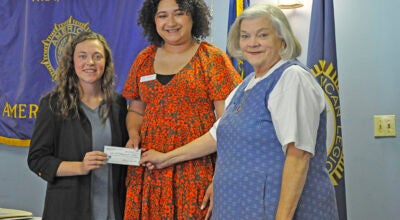Flu season in full swing
Published 10:32 pm Friday, January 28, 2011
The Alabama Department of Public Health has reported a “widespread” influenza activity during the week, and some area health officials are saying they see that increase locally.
“We didn’t see much of the flu before the students left on their Christmas break, but when they got back they must’ve brought the flu back with them,” said Dimple A. Gilbert, director of student health services at Troy University. “We’ve probably had at least eight to 10 students a week come in with the flu, and of course we have seen students with flu-like illnesses. A lot of times, students will come in with the same types of symptoms as the flu, but tests will come up negative.”
The ADPH reports that of the influenza-positive specimens submitted to the Alabama Bureau of Clinical Laboratories (BCL), there has been a 4 percent increase in the influenza A (H1N1) strain; a 19 percent increase in the influenza A (H3) strain; and a 77 percent increase in the influenza B strain throughout the state.
Medical doctors also have seen an increase in patient visits due to influenza-like illnesses statewide.
Reports indicate that doctor visits due to flu-like illnesses are up from the previous week of 10.7 percent to 13.7 percent.
According to ADPH, the baseline of significant influenza activity for the state of Alabama for the 2010-2011 flu season is 4.71 percent.
Debbie Baker, nurse and supervisor for the Pike County Health Department, offered her expertise in preventive techniques to stave off the viral infection.
“We encourage people to cover their nose and mouth with tissue when they cough or sneeze, and then, of course, discard the tissue,” Baker said.
Baker promoted the use of your elbow to cough or sneeze in if there isn’t a tissue available.
She even emphasized good hand hygiene.
“We encourage good hand hygiene, wash your hands frequently with soap and water, or use an alcohol-based hand gel,” Baker said. “Also, avoid touching your eyes, nose and mouth.”
Melissa Scarbrough, RN, supervising Nnurse for Troy City Schools, echoed Baker’s safety precautions.
“Practice good hand washing skills,” Scarbrough said.
“Teach children good hygiene and how to cough and sneeze into their sleeve instead of their hands.”
Although she has started to see a few cases of influenza, Scarbrough says she hasn’t been overrun with new cases of the flu.
“Last year, we had dozens of cases throughout our system,” Scarbrough said. “We monitored cases everyday to see if we would have any reason to close school, but we never reached that magic number.”
Scarbrough advises parents to make sure their children have been fever free for at least a full 24 hours before sending them back to school.
“We would like children to be fever free before they come back to school,” Scarbrough said.





